ADVERTISEMENT
Allergic Reactions: If you’re sensitive to scents or have allergies to essential oils, consider using a combination of vinegar and baking soda to clean your mattress.
For Severe Infestations: If natural methods do not work and you’re dealing with a severe bedbug infestation, it might be necessary to consult a pest control professional for a thorough treatment.
FAQ:
How often should I clean my mattress?
It’s recommended to clean your mattress every 2-3 months to maintain a healthy sleeping environment. If you notice signs of pests or allergic reactions, clean it more often.
Can essential oils really repel bedbugs?
While essential oils may help deter pests, they are more effective as a preventative measure. For severe bedbug infestations, consider using more targeted methods like diatomaceous earth or seeking professional pest control.
Is diatomaceous earth safe to use?
Yes, food-grade diatomaceous earth is non-toxic to humans and pets when used as directed. However, avoid inhaling the dust, as it can irritate the respiratory system. Always use it in a well-ventilated area.
What is the best way to store my mattress when not in use?
Store your mattress in a dry, cool place, and cover it with a protective cover to prevent dust, moisture, and pests. Avoid placing it directly on the floor, as this can expose it to pests and dirt.
Are there any natural alternatives to commercial mattress cleaners?
Yes! Baking soda, essential oils, and vinegar are all natural alternatives that can effectively clean and refresh your mattress without the use of harsh chemicals. These ingredients are safe, affordable, and eco-friendly options.
By incorporating these simple, natural methods, you can maintain a cleaner and healthier mattress, ensuring a better night's sleep and reducing the risk of allergens and pests.
ADVERTISEMENT
